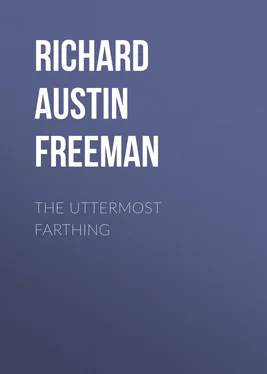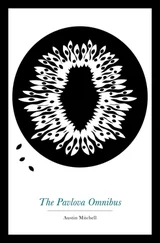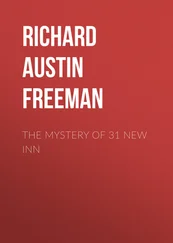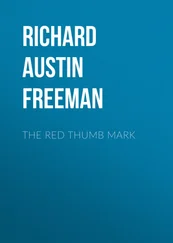Richard Austin Freeman - The Uttermost Farthing
Здесь есть возможность читать онлайн «Richard Austin Freeman - The Uttermost Farthing» — ознакомительный отрывок электронной книги совершенно бесплатно, а после прочтения отрывка купить полную версию. В некоторых случаях можно слушать аудио, скачать через торрент в формате fb2 и присутствует краткое содержание. Жанр: foreign_prose, Классический детектив, foreign_detective, foreign_antique, на английском языке. Описание произведения, (предисловие) а так же отзывы посетителей доступны на портале библиотеки ЛибКат.
- Название:The Uttermost Farthing
- Автор:
- Жанр:
- Год:неизвестен
- ISBN:нет данных
- Рейтинг книги:3 / 5. Голосов: 1
-
Избранное:Добавить в избранное
- Отзывы:
-
Ваша оценка:
- 60
- 1
- 2
- 3
- 4
- 5
The Uttermost Farthing: краткое содержание, описание и аннотация
Предлагаем к чтению аннотацию, описание, краткое содержание или предисловие (зависит от того, что написал сам автор книги «The Uttermost Farthing»). Если вы не нашли необходимую информацию о книге — напишите в комментариях, мы постараемся отыскать её.
The Uttermost Farthing — читать онлайн ознакомительный отрывок
Ниже представлен текст книги, разбитый по страницам. Система сохранения места последней прочитанной страницы, позволяет с удобством читать онлайн бесплатно книгу «The Uttermost Farthing», без необходимости каждый раз заново искать на чём Вы остановились. Поставьте закладку, и сможете в любой момент перейти на страницу, на которой закончили чтение.
Интервал:
Закладка:
"Having settled on the method, I was disposed to put it into practice at once; but then another consideration arose. My wife would have to be buried. By some hands she must be laid in her last resting-place, and those hands could be none other than my own. So I must stay behind for a little while.
"The hours passed on unreckoned until pencils of cold blue daylight began to stream in through the chinks of the shutters and contend with the warm gaslight within. Then another footstep was heard on the stairs and the cook, Wilson, came into the room. She, like the housemaid, stopped dead when she saw my wife's corpse, and stood for an instant staring wildly with her mouth wide open. But only for an instant. The next she was flying out of the front door, rousing the street with her screams.
"The advent of the cook roused me. I knew that the police would arrive soon and I instinctively looked about me to see how this unspeakable thing had happened. I had already noticed that one of my wife's hands—the one that I had not been holding—was clenched, and I now observed that it grasped a little tuft of hair. I drew out a portion of the tuft and looked at it. It was coarse hair, about three inches long and a dull gray in color. I laid it on the clean note-paper in the drawer of the bureau bookcase to examine later, and then glanced around the room. The origin of the tragedy was obvious. The household plate had been taken out of the plate chest in the pantry and laid out on the end of the dining table. There the things stood, their polished surfaces sullied by the greasy finger-marks of the wretch who had murdered my wife. At those tell-tale marks I looked with new and growing interest. Finger-prints, in those days, had not yet been recognized by the public or the police as effective means of identification. But they were well known to scientific men and I had given the subject some attention myself. And the sight of those signs-manual of iniquity had an immediate effect on me; they converted the unknown perpetrator of this horror from a mere abstraction of disaster into a real, living person. With a sudden flush of hate and loathing, I realized that this wretch was even now walking the streets or lurking in his accursed den; and I realized, too, that these marks were, perhaps, the only links that connected him with the foul deed that he had done.
"I looked over the plate quickly and selected a salver and a large, globular teapot, on both of which the prints were very distinct. These I placed in a drawer of the bureau, and, turning the key, dropped it into the pocket of my pajamas. And at that moment the bell rang violently.
"I went to the door and admitted a police constable and the cook. The latter looked at me with evident fear and horror and the constable said, somewhat sternly:
"'This young woman tells me there's something wrong here, sir.'
"I led him into the dining-room—the cook remained at the door, peering in with an ashen face—and showed him my wife's corpse. He took off his helmet and asked rather gruffly how it happened. I gave him a brief account of the catastrophe, on which he made no comment except to remark that the inspector would be here presently.
"The inspector actually arrived within a couple of minutes, accompanied by a sergeant, and the two officers questioned me closely. I repeated my statement and saw at once that they did not believe me; that they suspected me of having committed the murder myself. I noted the fact with dull surprise but without annoyance. It didn't seem to matter to me what they thought.
"They called the cook in and questioned her, but, of course, she knew nothing. Then they sent her to find the housemaid. But the housemaid had disappeared and her outdoor clothes and a large hand-bag had disappeared too; which put a new complexion on the matter. Then the officers examined the plate and looked at the finger-marks on it. The constable discovered the tuft of hair in my poor wife's hand, and the inspector having noted its color and looked rather hard at my hair, put it for safety in a blue envelope, which he pocketed; and I suspect it never saw the light again.
"About this time the police surgeon arrived, but there was nothing for him to do but note the state of the body as bearing on the time at which death took place. The police took possession of some of the plate with a dim idea of comparing the finger-prints with the fingers of the murderer if they should catch him.
"But they never did catch him. Not a vestige of a clue to his identity was ever forthcoming. The housemaid was searched for but never found. The coroner's jury returned a verdict of 'wilful murder' against some person unknown. And that was the end of the matter. I accompanied my dearest to the place where she was laid to rest, where soon I shall join her. And I came back alone to the empty house.
"It is unnecessary for me to say that I did not kill myself. In the interval I had seen things in a new light. It was evident to me from the first that the police would never capture that villain. And yet he had to be captured. He had incurred a debt, and that debt had to be paid. Therefore I remained behind to collect it.
"That was twenty years ago, Wharton; twenty long, gray, solitary years. Many a time have I longed to go to her, but the debt remained unpaid. I have tried to make the time pass by getting my little collection together and studying the very instructive specimens in it; and it has lightened the burden. But all the time I have been working to collect that debt and earn my release."
He paused awhile, and I ventured to ask: "And is the debt paid?"
"At last it is paid."
"The man was caught, then, in the end?"
"Yes. He was caught."
"And I hope," I exclaimed fervently, "that the scoundrel met with his deserts; I mean, that he was duly executed."
"Yes," Challoner answered quietly, "he was executed."
"How did the police discover him, after all?" I asked.
"You will find," said Challoner, "a full account of the affair in the last volume of the 'Museum Archives';" then, noting the astonishment on my face at this amazing statement, he added: "You see, Wharton, the 'Museum Archives' are, in a sense, a personal diary; my life has been wrapped up in the museum and I have associated all the actions of my life with the collection. I think you will understand when you read it. And now let us dismiss these recollections of a ruined life. I have told you my story; I wanted you to hear it from my own lips, and you have heard it. Now let us take a glass of wine and talk of something else."
I looked at my watch and, finding it much later than I had supposed, rose to take my leave.
"I oughtn't to have kept you up like this," I said. "You ought to have been in bed an hour ago."
Challoner laughed his queer muffled laugh. "Bed!" exclaimed he. "I don't go to bed nowadays. Haven't been able to lie down for the last fortnight."
Of course he hadn't. I might have known that. "Well," I said, "at any rate, let me make you comfortable for the night before I go. How do you generally manage?"
"I rig up a head-rest on the edge of the table, pull up the armchair, wrap myself in a rug and sleep leaning forward. I'll show you. Just get down Owen's 'Comparative Anatomy' and stack the volumes close to the edge of the table. Then set up Parker's 'Monograph on the Shoulder-girdle' in a slanting position against them. Fine book, that of Parker's. I enjoyed it immensely when it first came out and it makes a splendid head-rest. I'll go and get into my pajamas while you are arranging the things."
He went off to his adjacent bedroom and I piled up the ponderous volumes on the table and drew up the armchair. When he returned, I wrapped him in a couple of thick rugs and settled him in his chair. He laid his arms on the massive monograph, rested his forehead on them and murmured cheerfully that he should now be quite comfortable until the morning. I wished him "good-night" and walked slowly to the door, and as I held it open I stopped to look back at him. He raised his head and gave me a farewell smile; a queer, ugly smile, but full of courage and a noble patience. And so I left him.
Читать дальшеИнтервал:
Закладка:
Похожие книги на «The Uttermost Farthing»
Представляем Вашему вниманию похожие книги на «The Uttermost Farthing» списком для выбора. Мы отобрали схожую по названию и смыслу литературу в надежде предоставить читателям больше вариантов отыскать новые, интересные, ещё непрочитанные произведения.
Обсуждение, отзывы о книге «The Uttermost Farthing» и просто собственные мнения читателей. Оставьте ваши комментарии, напишите, что Вы думаете о произведении, его смысле или главных героях. Укажите что конкретно понравилось, а что нет, и почему Вы так считаете.












